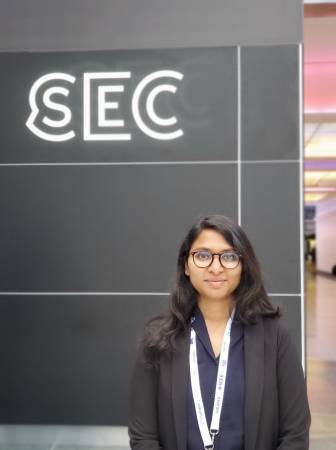Seminar
Design and Analysis of Open-Source Educational Haptic Devices
Abstract: The sense of touch (haptics) is an active perceptual system used from our earliest days to discover the world around us. However, formal education is not designed to take advantage of this sensory modality. As a result, very little is known about the effects of using haptics in K-12 and higher education or the [...]
Towards AI for 3D Content Creation
Abstract: 3D content is key in several domains such as architecture, film, gaming, and robotics. However, creating 3D content can be very time consuming -- the artists need to sculpt high quality 3d assets, compose them into large worlds, and bring these worlds to life by writing behaviour models that "drives" the characters around in [...]
Move over, MSE! – New probabilistic models of motion
Abstract: Data-driven character animation holds great promise for games, film, virtual avatars and social robots. A "virtual AI actor" that moves in response to intuitive, high-level input could turn 3D animators into directors, instead of requiring them to laboriously pose the character for each frame of animation, as is the case today. However, the high [...]
Understanding the Placenta: Towards an Objective Pregnancy Screening
Abstract: My research focusses on the development of a pregnancy screening tool, that will be: (i) system and user-independent; and (ii) provides a quantifi able measure of placental health. With this end, I am working towards the design of a multiparametric quantitative ultrasound (QUS) based placental tissue characterization method. The method would potentially identify the [...]
Human-Robot Interactive Collaboration & Communication
Abstract: Autonomous and anthropomorphic robots are poised to play a critical role in manufacturing, healthcare and the services industry in the near future. However, for this vision to become a reality, robots need to efficiently communicate and interact with their human partners. Rather than traditional remote controls and programming languages, adaptive and transparent techniques for [...]
Carnegie Mellon University
Robots “R” Us: 25 years of Robotics Technology Development and Commercialization at NREC
Abstract: Since its founding in 1979, the Robotics Institute (RI) at Carnegie Mellon University has been leading the world in robotics research and education. In the mid 1990s, RI created NREC as the applied R&D center within the Institute with a specific mission to apply robotics technology in an impactful way on real-world applications. In this talk, I will go over [...]
Relational Reasoning for Multi-Agent Systems
Abstract: Multi-agent interacting systems are prevalent in the world, from purely physical systems to complicated social dynamics systems. The interactions between entities / components can give rise to very complex behavior patterns at the level of both individuals and the whole system. In many real-world multi-agent interacting systems (e.g., traffic participants, mobile robots, sports players), [...]
Towards an Intelligence Architecture for Human-Robot Teaming
Abstract: Advances in autonomy are enabling intelligent robotic systems to enter human-centric environments like factories, homes and workplaces. To be effective as a teammate, we expect robots to accomplish more than performing simplistic repetitive tasks; they must perceive, reason, perform semantic tasks in a human-like way. A robot's ability to act intelligently is fundamentally tied [...]
Self-supervised learning for visual recognition
Abstract: We are interested in learning visual representations that are discriminative for semantic image understanding tasks such as object classification, detection, and segmentation in images/videos. A common approach to obtain such features is to use supervised learning. However, this requires manual annotation of images, which is costly, ambiguous, and prone to errors. In contrast, self-supervised [...]
GANs for Everyone
Abstract: The power and promise of deep generative models such as StyleGAN, CycleGAN, and GauGAN lie in their ability to synthesize endless realistic, diverse, and novel content with user controls. Unfortunately, the creation and deployment of these large-scale models demand high-performance computing platforms, large-scale annotated datasets, and sophisticated knowledge of deep learning methods. This makes [...]
Reasoning over Text in Images for VQA and Captioning
Abstract: Text in images carries essential information for multimodal reasoning, such as VQA or image captioning. To enable machines to perceive and understand scene text and reason jointly with other modalities, 1) we collect the TextCaps dataset, which requires models to read and reason over text and visual content in the image to generate image [...]
Design and control of insect-scale bees and dog-scale quadrupeds
Abstract: Enhanced robot autonomy---whether it be in the context of extended tether-free flight of a 100mg insect-scale flapping-wing micro aerial vehicle (FWMAV), or long inspection routes for a quadrupedal robot---is hindered by fundamental constraints in power and computation. With this motivation, I will discuss a few projects I have worked on to circumvent these issues in [...]
Point Cloud Registration with or without Learning
Abstract: I will be presenting two of our recent works on 3D point cloud registration: A scene flow method for non-rigid registration: I will discuss our current method to recover scene flow from point clouds. Scene flow is the three-dimensional (3D) motion field of a scene, and it provides information about the spatial arrangement [...]
Dynamical Robots via Origami-Inspired Design
Abstract: Origami-inspired engineering produces structures with high strength-to-weight ratios and simultaneously lower manufacturing complexity. This reliable, customizable, cheap fabrication and component assembly technology is ideal for robotics applications in remote, rapid deployment scenarios that require platforms to be quickly produced, reconfigured, and deployed. Unfortunately, most examples of folded robots are appropriate only for small-scale, low-load [...]
Propelling Robot Manipulation of Unknown Objects using Learned Object Centric Models
Abstract: There is a growing interest in using data-driven methods to scale up manipulation capabilities of robots for handling a large variety of objects. Many of these methods are oblivious to the notion of objects and they learn monolithic policies from the whole scene in image space. As a result, they don’t generalize well to [...]
When and Why Does Contrastive Learning Work?
Abstract: Contrastive learning organizes data by pulling together related items and pushing apart everything else. These methods have become very popular but it's still not entirely clear when and why they work. I will share two ideas from our recent work. First, I will argue that contrastive learning is really about learning to forget. Different [...]
Anticipating the Future: forecasting the dynamics in multiple levels of abstraction
Abstract: A key navigational capability for autonomous agents is to predict the future locations, actions, and behaviors of other agents in the environment. This is particularly crucial for safety in the realm of autonomous vehicles and robots. However, many current approaches to navigation and control assume perfect perception and knowledge of the environment, even though [...]
Learning to Perceive Videos for Embodiment
Abstract: Video understanding has achieved tremendous success in computer vision tasks, such as action recognition, visual tracking, and visual representation learning. Recently, this success has gradually been converted into facilitating robots and embodied agents to interact with the environments. In this talk, I am going to introduce our recent efforts on extracting self-supervisory signals and [...]
Open Challenges in Sign Language Translation & Production
Abstract: Machine translation and computer vision have greatly benefited of the advances in deep learning. The large and diverse amount of textual and visual data have been used to train neural networks whether in a supervised or self-supervised manner. Nevertheless, the convergence of the two field in sign language translation and production is still poses [...]
The Search for Ancient Life on Mars Began with a Safe Landing
Abstract: Prior mars rover missions have all landed in flat and smooth regions, but for the Mars 2020 mission, which is seeking signs of ancient life, this was no longer acceptable. To maximize the variety of rock samples that will eventually be returned to earth for analysis, the Perseverance rover needed to land in a [...]
3D Recognition with self-supervised learning and generic architectures
Abstract: Supervised learning relies on manual labeling which scales poorly with the number of tasks and data. Manual labeling is especially cumbersome for 3D recognition tasks such as detection and segmentation and thus most 3D datasets are surprisingly small compared to image or video datasets. 3D recognition methods are also fragmented based on the type [...]
Rapid Adaptation for Robot Learning
Abstract: How can we train a robot to generalize to diverse environments? This question underscores the holy grail of robot learning research because it is difficult to supervise an agent for all possible situations it can encounter in the future. We posit that the only way to guarantee such a generalization is to continually learn and [...]
Robotic Cave Exploration for Search, Science, and Survey
Abstract: Robotic cave exploration has the potential to create significant societal impact through facilitating search and rescue, in the fight against antibiotic resistance (science), and via mapping (survey). But many state-of-the-art approaches for active perception and autonomy in subterranean environments rely on disparate perceptual pipelines (e.g., pose estimation, occupancy modeling, hazard detection) that process the same underlying sensor data in [...]






















